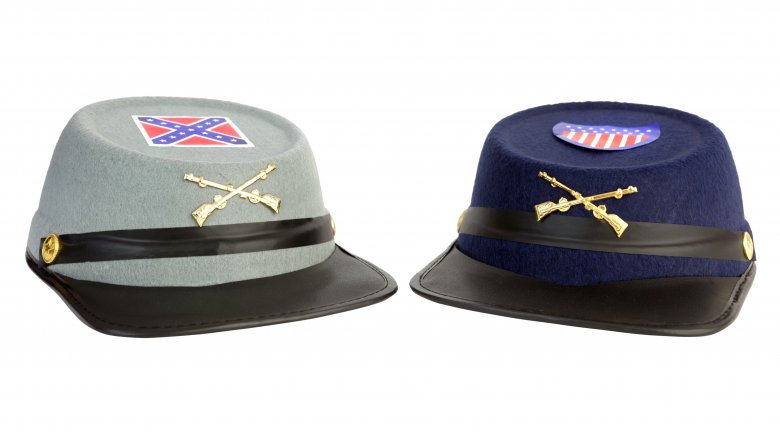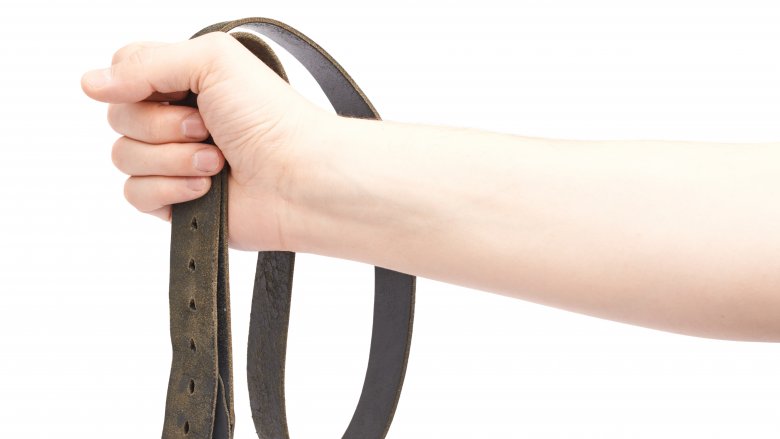These Are The Saddest Phrases In The English Language
Language is powerful. It defines human perception, frames reality, and makes it possible for people to describe increasingly complex ideas with slick metaphors. If you've ever wondered why it's so hard to learn a new language, just think about some of the strange phrases you hear on the street every day. Seriously, have you ever seen cats and dogs falling from the sky? Why are those wooden sticks holding up a table called "legs," exactly? For that matter, why would you ever tell someone that you hope they "break a leg," and what does "kicking the bucket" have to do with dying? It's verbal madness!
While this crazy imagery is all in good fun, the unfortunate truth is that some of today's most popular phrases have some truly tragic origins. Certain common sayings are rooted in deep prejudice. Others refer to gruesome old traditions. Plenty of them are just plain bummers. Come along with us on a linguistic adventure through the origins of the saddest phrases in the English language.
What a basket case!
If you've ever called yourself a "basket case," figuring that it was just a funny way to explain how stressed out you were about the holidays, well, get ready for a revoltin' development. No matter which way you look at it, this particular basket is filled with some awful history.
As with so many terrible things, the phrase "basket case" was created by war. World War I, to be precise. According to the Oxford English Dictionary, American soldiers who lost all four limbs were referred to by their fellow troops as "basket cases," with the implication being that the disabled people had been rendered so "useless" by their injuries that they'd have to be carried around in a basket. By the mid-20th century, according to The Guardian, the term also came to describe people living with mental illnesses, usually as a way to ignore their struggles. Essentially, if your buddy Suzie is having a meltdown, writing her off as a crazed "basket case" implies that you're not going to bother listening to her, talking with her, or doing anything else helpful. No matter which way you look at it, the term basket case has always been a sneaky way to marginalize people in pain.
The deadline is...
Hey, this one goes out to all you procrastinators out there. Yes, you know who you are. Have you ever spent a long night staring at a glowing screen, guzzling down coffee, and ignoring the irritation of your significant other while praying that a second wind catches you soon? Well, for you folks, the word "deadline" is already the most depressing entry in the English dictionary. Really, though, deadlines aren't so bad... especially when you compare them to the original "dead lines" from the 1860s, where the punishment was a lot worse than a stern lecture from your hardworking Communications professor.
See, back in the U.S. Civil War, "dead lines" were literal lines in the dirt, rather than metaphorical ones. As Merriam-Webster explains, these boundaries were drawn either in or around Confederate prisons, where captured Union soldiers were kept. If one of the captured POWs decided to walk over the line, he would be shot. Yes, that's right: no extensions, no debates. "Dead" really meant dead. Needless to say, these prisons became infamous for their harsh conditions and poor treatment of U.S. soldiers.
You sold me down the river!
When a person complains that their former friend, lover, or coworker betrayed them, they might say that the offender "sold them down the river." The listener, in response, might pause and wonder, "Now, where did that phrase come from? I hope it didn't originally mean..."
...unfortunately, yes, it's about slavery. The river in question was the Mississippi, or sometimes the Ohio. As NPR elaborates, these waterways were a one-way ticket to Louisville, Kentucky, one of the biggest slave marketplaces in the U.S. at that time. Men forced into slavery would be separated from their families and sold "down the river" at the Kentucky marketplace, purchased, then sent further south to spend the rest of their lives toiling away in brutal cotton plantations, enduring horrendous labor, torture, and punishment. A snitching coworker hardly seems like an appropriate target for a phrase related to one of the most horrific institutions in history.
What an idiot, moron, and/or imbecile.
People love to ridicule one another's intelligence. The problem? Almost every word you've ever used to do so is based on a discriminatory term for people with developmental disabilities. Sure, most mature people never throw around "the R-word" today, as The Boston Globe points out, but most of the other words you use to make someone sound dumb are rooted in the same systemic marginalization that the developmentally disabled have faced throughout history.
For example, Merriam-Webster says that the terms idiot, imbecile, and moron were once used as a psychological classification system for people with developmental disabilities, with idiot on the low end of the scale, and moron on the high end. None of this was innocuous medical jargon, though. These terms were specifically used to demean the diagnosed, as proven by the etymology of "moron," which stems from the Greek mōros, meaning "foolish, stupid."
These terms went through a long evolution from insensitive medical classifications to offensive slurs, and people use them today with very little awareness of their problematic history. In general, all of these terms disregard the real human individuals who live with developmental disabilities by writing them off with labels rather than understanding them as real people.
He's mad as a hatter.
The origin of the phrase "mad as a hatter" seems easy to pinpoint. After all, one of the most popular characters in Alice's Adventures in Wonderland is that jolly little fellow with the big hat, defined by his mad outlook. Lewis Carroll invented the term... right?
Wrong. Actually, Carroll's tea party-loving chapeau enthusiast was based on the phrase, rather than the other way around. As History explains, "mad as a hatter" is an example of stereotypes regarding real hat-makers in the 18th and 19th Centuries, most of whom used a certain substance called mercury nitrate as part of the hat-making process. Why were they "mad?" Well, because when you combine a toxic chemical with poor (or nonexistent) workplace safety protocols, you end up with mercury poisoning, which causes lifelong ailments ranging from hallucinations to speech difficulties to tremors, the latter of which were once called "hatter's shakes." It wasn't until the 1940s that using mercury for hat production was finally banned, and by that point, these negative associations had plagued hat-makers for over a century.
Blame the whipping boy.
Everybody's had that one boss who never admits his mistakes. Sure, it was actually his idea for you to paste the CEO's head into a cheesy surfing video for the annual holiday party, but when the CEO is less than amused, that sketchy boss will always blame the goofy stunt on you. That makes you the office "whipping boy," and as horrible as that position is, it was a lot worse a few centuries ago.
Back in the days where the old English monarchy was still top dog, as Oxford points out, the "whipping" in question wasn't metaphorical. According to Phrase Finder, it was once common for the crown prince to be raised alongside a not-so-royal young companion. This young lad would be educated alongside his princely buddy, given fine meals, treated with honors... and, uh, whipped if the prince did anything wrong.
If that sounds insane (it is), keep in mind that back then, the English court believed that the monarchy was a sacred line of godly lieutenants, and no tutor wanted to be the one caught abusing the oh-so-divine prince. The overall theory was that if the prince and his whipping boy were close buddies, the prince would get upset at his friend being hurt, and not step out of line again. On the other hand, though, if the prince was a bloodthirsty brat like that blond kid on Game of Thrones...
A die-hard fan.
History is cyclical, and so far, every generation has complained that kids are breaking cultural taboos, changing norms, or ruining their minds with violent movies like that one 1988 Christmas flick with Bruce Willis. These debates are pretty silly, though, when you stop to consider that almost anything that today's culture deems "gruesome" is still a lot less violent than the horrific things your ancestors did for fun.
Case in point? Public hangings. Yeah, that's right. Not that long ago, everybody's favorite family event was to line up with your kid on your shoulders and cheer as the latest convict is choked to death in front of you. Now, back in the 1700s, according to Phrase Finder, these hangings didn't yet use the "drop" method everyone knows today. No quick drop means that the hanging takes longer and is more painful, which resulted in a lot of individuals flailing, thrashing, and generally struggling to survive as the rope tightened around their throats.
These folks came to be recognized as "die-hards," since they died hard, rather than easily. By the 1800s, the term spread to the battlefield, as "die hard" evolved to mean fighting to the bitter end. The general connection between dying hard and stubbornness persisted to the present day. Now, the term describes Star Wars fans who still complain about how The Phantom Menace killed their childhood.
That present was just a white elephant.
If you've ever unwrapped a massive birthday present from your uncle and found yourself as the not-so-proud owner of a hideous kitchen table, which you're now expected to hold onto forever, that's what you call a "white elephant." Unlike your kitchen table, real white (or rather, albino) elephants are beautiful creatures, but the official word is that they're quite difficult to take care of. According to Dictionary.com, the "white elephant" metaphor first hit print in the 1850s, to describe a rather peculiar custom in Siam, now Thailand, wherein the king would "reward" a difficult and/or obnoxious subordinate with one of these giant, pale specimens. As Phrase Finder elaborates, because white elephants were regarded as sacred animals, their owners had to provide access to anyone who wanted to worship the creature, in addition to special food, care, and maintenance.
In other words, if the King of Siam gave you a white elephant, he was trying to make you go bankrupt. Did this sort of exchange really happen? Hard to say. But the myths surrounding it definitely inspired the phrase, and gave you a handy way to describe that ugly table that will be occupying your kitchen for years to come.
Wow, you've gone off the reservation.
People usually use the phrase "off the reservation" to describe someone who is doing the opposite of what they're supposed to be doing. The problem is that, as NPR explains, the negative connotations of "off the reservation" are rooted in the centuries of mistreatment that North America's indigenous population has suffered under the United States government.
Historically, the "reservations" in question have been increasingly small spaces that the U.S. restricted the native population into, under severe limitations that indigenous leaders were forced to sign. While the U.S. Government, throughout history, was comfortable violating these same treaties over and over again, the marginalized people themselves were expected to stay put in their reservations, without complaint. Hence, today, if any person is doing something that is not culturally accepted, they are accused of being like a native individual who is "off the reservation." So, not only does this phrase have an incredibly bloody history, it also perpetuates harmful stereotypes regarding oppressed peoples.









